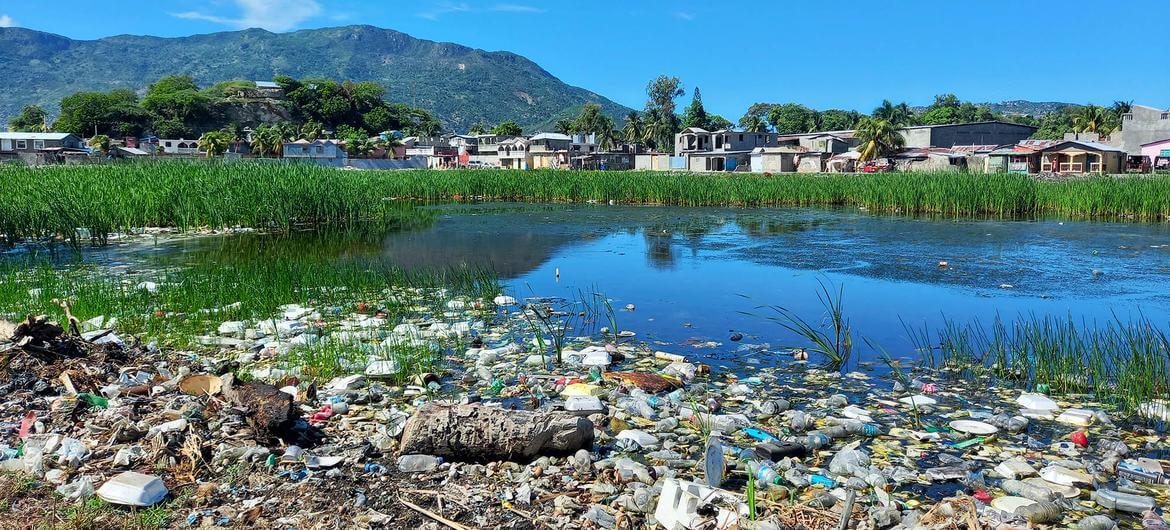The United Nations said on Friday that the unsafe migration of people from Haiti could be reduced by a recycling initiative that is aimed at tackling environmental degradation.
The UN said the initiative, launched by its International Organization for Migration (IOM), will not only help to improve the environment but may also provide new housing, “which is resilient to natural disasters.”
On the International Day of Migrants, celebrated annually on Dec. 18, UN Haiti said it looks at “how recycling could make a contribution towards people staying at home rather than risking migration through unofficial or irregular channels.
“One of the causes of Haitians wanting to leave their country is the degradation of the environment, including deforestation and soil erosion.,” UN Haiti said. “This means that many people can no longer sustain a living where they are and are falling deeper into poverty. This is especially true in rural areas.
“This degradation deepens the threat of natural disasters like hurricanes, flooding, drought and earthquakes, which Haiti is particularly susceptible to,” it added. “This combination of factors is making people even more vulnerable, especially when they are not able to access jobs or basic services, like health care and education.”
UN Haiti pointed to research that shows that when people are more vulnerable, especially as a result of natural disasters, they are more likely to migrate in search of more safety and, ultimately, a better life.
“Haiti’s natural environment has been under pressure for some time; soil erosion and landslides linked to deforestation, increased pollution and waste as a result of urbanization and a series of natural disasters have all led to the deterioration of the environment,” UN Haiti said. “The effects of climate change are exacerbating the current situation.
“These conditions weaken the country, leading to food insecurity and increased migration,” it added, stating that waste management remains “very rudimentary in Haiti and much worse than other countries in the region. Recycling is one initiative to reduce waste and improve the environment and brings a number of benefits, even if only on a limited scale.”
UN Haiti said an increasing number of migrants are leaving Haiti for a variety of reasons.
It said poverty and economic factors, including the lack of jobs and opportunities, are playing a significant role, but added that “security-related concerns, especially in the capital Port-au-Prince, are also significant.”
UN Haiti said the August 2021 earthquake and other broadly climate-related stresses are other factors driving people from their homes.
“Migration isn’t a problem in itself; the concern is that many of the people who are leaving are amongst the poorest and most vulnerable,” it said. “They are more likely to migrate in unofficial or irregular ways, for example by sea, which can often be more dangerous than planned migration.”
UN Haiti said plastic recycling presents a number of benefits, including a cleaner, less polluted and, “thus, healthier environment.”
In addition, it said recycling creates jobs give people “a reason to remain where they are.”
UN Haiti said the IOM project in partnership with the Haitian government and recycling organizations, and is “looking to multiply the benefits of recycling.
“It will do this by developing an innovative and sustainable construction material from the plastic waste, which could be used to build houses which are more resistant to extreme weather like hurricanes and floods, as well as catastrophic natural disasters, such as earthquakes,” UN Haiti said.
“Reducing the risk of disasters will mean that fewer people are affected in a time of crisis, so they are less likely to be displaced from their homes and may not consider migrating,” it added. “Recycling is one small part of a range of interventions which can halt environmental degradation and contribute to the slowing down of irregular and unsafe migration.”
UN Haiti said the project could be very useful in conjunction with other aspects of an environmental and climate action agenda, including reforestation, sustainable energy production and a circular economy, where material considered as waste is reused rather than disposed of.
In a message just ahead of International Migrants Day, celebrated on Saturday, the United Nations Secretary-General said that expressing solidarity with migrants on the move “has never been more urgent.”
The UN said, today, more people than ever live in a country other than the one where they were born.
“While many individuals migrate out of choice, many others leave home out of necessity,” said the UN, stating that about 281 million people were international migrants in 2020, representing 3.6 per cent of the global population.
In his message, Guterres said those on the move “continue to face widespread stigmatization, inequalities, xenophobia and racism.
“Migrant women and girls face heightened risk of gender-based violence and have fewer options to seek support”, he added.
With borders closed because of the pandemic, Guterres remembered that many migrants are stranded, without income or shelter, unable to return home, separated from their families and facing an uncertain future.
“Yet, throughout the pandemic, migrants have enriched societies everywhere and are often on the frontlines of the pandemic response, as scientists, healthcare professionals and essential workers”, he said.
For the UN chief, the world needs more effective international cooperation and a more compassionate approach to accomplish that goal.
“This means managing borders humanely, fully respecting the human rights and humanitarian needs of everyone and ensuring that migrants are included in national COVID-19 vaccination plans”, he said.
Guterres said it also means recognizing pathways for regular entry, and addressing the drivers of migration, such as deep inequalities and human trafficking.
Next year, the UN said the International Migration Review Forum will take stock of progress in implementing the milestone Global Compact for Safe, Orderly and Regular Migration.
Guterres said this “is an opportunity to advance efforts to ensure the full inclusion of migrants as we seek to build more resilient, just and sustainable societies.”
He welcomed the pledging campaign launched by the United Nations Migration Network to strengthen the Global Compact and encourage member states and others to get involved.



























